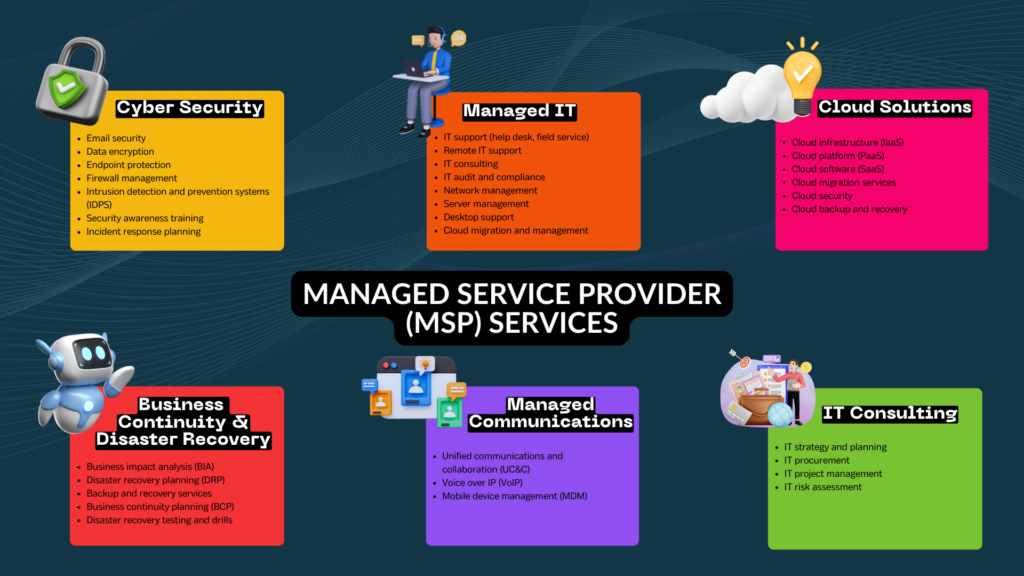Did you know that 60% of cyberattacks target small and medium-sized businesses? Nowadays, protecting your business from cyber threats is crucial. Therefore, a Managed Services Provider (MSP) can help reduce this burden. They offer complete IT solutions, including strong cybersecurity measures. In this guide, we will explore the benefits of MSPs. Additionally, we will cover the services they offer. Finally, we will help you choose the right MSP to meet your needs.
What is a managed service provider?
MSPs are external companies that manage and maintain IT systems, networks, and security for other businesses. By outsourcing these essential functions, businesses can lower costs and increase efficiency. As a result, they can focus on their core strengths.

The Evolution of Managed Services
The evolution of Managed Service Providers (MSPs) can be traced back to the early days of Application Service Providers (ASPs). In fact, these early providers offered software applications over the internet, laying the foundation for the remote delivery of IT services.
Key milestones in the evolution of MSPs include the rise of Remote Monitoring and Management (RMM) tools in the late 1990s. These tools enabled proactive IT management. Moreover, the early 2000s saw the emergence of cloud computing, which revolutionised the IT landscape and expanded the scope of MSP services.
Technological advancements such as cloud computing, artificial intelligence (AI), and the Internet of Things (IoT) have significantly shaped the MSP landscape. For example, cloud computing has enabled MSPs to offer scalable and flexible solutions. Additionally, AI and automation have streamlined operations and improved service delivery. As a result, IoT devices have generated vast amounts of data, creating new opportunities for MSPs to provide data analytics and insights to their clients.
Core Services Offered by Managed Services Providers

MSPs provide a wide range of IT services to help businesses streamline operations and improve efficiency. So here are some of the core services offered by MSPs:
IT Infrastructure Management
- Network Management: Ensuring optimal network performance and security.
- Server Management: Managing and maintaining servers to ensure reliability and uptime.
- Storage Solutions: Implementing and managing storage systems to safeguard critical data.
- Security Services: Protecting systems and data from cyber threats through measures like threat detection, vulnerability assessments, and security audits.
- Cloud Services: Migrating workloads to the cloud, optimising cloud environments, and managing cloud-based applications.
- End-User Support: Providing timely and effective support to employees, including help desk services and remote assistance.
- Additional Services: Offering specialised services like data center management and compliance support.
Data Management
- Data Backup and Recovery: Implementing robust backup and recovery strategies to protect against data loss.
- Data Storage and Management: Managing data storage solutions to ensure data accessibility and integrity.
- Data Analytics and Insights: Analysing data to uncover valuable insights and inform business decisions.
Cybersecurity
- Threat Detection and Response: Identifying and responding to cyber threats in real-time.
- Vulnerability Assessments: Identifying and addressing security weaknesses in systems and networks.
- Security Audits and Compliance: Ensuring compliance with industry regulations and standards.
- Security Awareness Training: Educating employees about cybersecurity best practices.
- Incident Response Planning and Execution: Developing and implementing plans for responding to cyber incidents.
Benefits of Using an Managed Services Provider
Cost Savings
By outsourcing IT operations to an MSP, businesses can significantly reduce costs. For example, MSPs can optimise IT spending by consolidating hardware and software licenses, negotiating better deals with vendors, and eliminating unnecessary expenses. Additionally, MSPs can often provide cost-effective solutions for smaller businesses that may not have the budget to hire a full-time IT team.
Improved Productivity
MSPs can free up valuable time for internal IT staff by handling routine tasks such as system maintenance, network monitoring, and help desk support. As a result, this allows IT teams to focus on strategic initiatives that can drive business growth and innovation. Furthermore, MSPs can help reduce downtime by proactively identifying and resolving issues before they impact business operations.
Enhanced Security

IT providers have access to advanced security tools and expertise to protect businesses from cyber threats. For instance, they can implement robust security measures, such as firewalls, intrusion detection systems, and regular security audits. Moreover, MSPs can provide proactive security monitoring and threat detection, helping to minimise the risk of data breaches and other security incidents.
Increased Scalability and Flexibility
Services providers can help businesses scale their IT infrastructure to meet changing business needs. In addition, they can quickly provision new hardware and software, and adjust their service levels to accommodate growth or fluctuations in demand. This flexibility allows businesses to respond to market changes and seize new opportunities.
Access to Expert Talent
Managed Services Provider has access to a pool of highly skilled IT professionals who can provide expertise in a variety of areas. For example network engineering, cybersecurity, and cloud computing. Therefore, businesses can tap into specialised knowledge without the need to hire and retain in-house experts.
24/7 Support and Monitoring
MSPs provide round-the-clock support and monitoring, ensuring that IT systems are always available and performing optimally. As a result, this minimises downtime and maximises productivity. With 24/7 support, businesses can rest assured that their IT infrastructure is in good hands, even outside of regular business hours.
Focus on Core Business
By outsourcing IT operations to an MSP, businesses can focus on their core competencies. This shift allows them to innovate, improve customer satisfaction, and drive revenue growth. Ultimately, by freeing up time and resources, MSPs empower businesses to achieve their strategic goals.
Choosing the Right MSP

Selecting the right Managed Service Provider in Australia is crucial for any business, especially in the dynamic tech landscape of Brisbane. Before starting, it’s essential to understand your specific needs. First, assess your current IT infrastructure, identify any pain points, and determine your business goals. For example, how can technology support your growth and strategic vision? With this roadmap in hand, you can confidently embark on your search for the ideal MSP partner.
Here are some key factors to consider when choosing an MSP in Brisbane:
Experience and Expertise.
Firstly, look for an MSP with a proven track record of success and deep industry knowledge. Ideally, they should have experience working with companies in your sector, understanding the unique challenges you face.
Service Level Agreements (SLAs).
Secondly, ensure the MSP offers clear and concise SLAs that outline their service commitments and guarantees. This includes uptime guarantees, response times, and escalation procedures. Don’t hesitate to ask questions and clarify any points before signing an agreement.
Security and Compliance.
Thirdly, in today’s digital age, robust security measures are paramount. Therefore, choose an MSP with a strong focus on cybersecurity, including firewalls, intrusion detection systems, and regular security audits. It’s also important that the MSP maintains relevant industry compliance certifications.
Customer Support.
Additionally, reliable and responsive customer support is essential. As such, evaluate the MSP’s support model and their response times to ensure they can address your needs swiftly and effectively. In addition, inquire about available support channels (phone, email, online portal) to find one that aligns with your preferences.
Pricing Models.
Moreover, MSPs offer various pricing models, such as per-device, per-user, or flat-rate. Thus, carefully assess each model and choose the one that best suits your budget and business requirements. Furthermore, don’t be afraid to negotiate and compare quotes from multiple MSPs before making a decision.
Scalability.
Furthermore, as your Brisbane business grows, your IT needs will inevitably evolve. For this reason, choose an MSP that can scale its services to accommodate your growth. Look for an MSP with the infrastructure and resources to adapt to your changing demands.
Cultural Fit.
Lastly, beyond technical expertise, consider the overall cultural fit. It’s important to choose an MSP whose values and approach align with your company culture. You want to partner with an MSP that feels like an extension of your team, fostering open communication and collaboration.
For additional insights on How to get the most out of your managed IT services provide, check out our related article.
By carefully considering these factors, you can select the right MSP in Australia. So your business will focus on core competencies while your IT infrastructure thrives under expert care.
The Future of Managed Services
The future of Managed Service Providers (MSPs) is bright, driven by technological advancements and evolving business needs. Therefore, let’s explore some key trends shaping the industry:

AI and Automation
Firstly, Artificial Intelligence (AI) and automation are revolutionising the way MSPs deliver services. In particular, AI-powered tools can automate routine tasks, such as patch management and network monitoring, freeing up IT professionals to focus on strategic initiatives. Moreover, machine learning algorithms can analyse vast amounts of data to identify potential security threats and optimise system performance.
Cloud-Native Services
Secondly, cloud-native services have become increasingly popular as businesses seek to improve scalability, flexibility, and cost-efficiency. As a result, MSPs play a crucial role in helping organisations adopt and manage cloud-based solutions. For example, they can provide services like cloud migration, cloud optimisation, and cloud security.
Cybersecurity Advancements
Thirdly, cybersecurity threats continue to evolve, making it essential for MSPs to stay ahead of the curve. Thus, MSPs are investing in advanced security technologies, such as endpoint detection and response (EDR), security information and event management (SIEM), and threat intelligence. Additionally, they are prioritising employee training to mitigate human error, a common cause of security breaches.
Verticalised MSPs
Finally, as industries become more specialised, MSPs are increasingly focusing on niche markets. In fact, verticalised MSPs offer tailored solutions to specific industries, such as healthcare, finance, and retail. By understanding the unique challenges and compliance requirements of these sectors, verticalised MSPs can provide more effective and efficient services.
The future of MSPs is exciting and full of potential. By embracing emerging technologies and adapting to evolving business needs, MSPs can continue to deliver value to their clients and drive industry innovation.
Conclusion
In conclusion, MSPs offer a multitude of benefits to businesses of all sizes. By outsourcing IT operations to an MSP, businesses can reduce costs, improve efficiency, enhance security, and focus on their core competencies. As technology continues to evolve, MSPs will play an increasingly important role in helping businesses navigate the complex digital landscape.
To gain the full benefits of an MSP, it’s essential to choose the right provider. In particular, consider factors such as experience, expertise, security, and customer support. By working with a reputable MSP, businesses can ensure the smooth operation of their IT infrastructure and achieve their strategic goals.
Are you ready to take the next step? Contact Netcomp today to discuss your specific needs and explore how they can help your business thrive.
FAQ
What is the difference between an MSP and an ISP?
An MSP (Managed Service Provider) is a company that provides a range of IT services, such as network management, cybersecurity, and cloud solutions. On the other hand, an ISP (Internet Service Provider) is a company that provides internet connectivity.
How much do managed services cost?
The pricing model for managed IT services can indeed vary significantly based on a number of factors, including:
• The specific services required. Firstly, whether you need basic IT support or advanced cybersecurity solutions will influence the cost.
• The size of your business. Secondly, the number of devices, users, and locations can impact the pricing.
• The complexity of your IT infrastructure. Thirdly, a more complex IT environment may require more advanced services and specialised expertise, which can increase costs.
• The level of support required. Also the level of support you need, such as 24/7 availability or on-site support, will affect the pricing.
• The provider’s pricing model. Some IT providers offer per-incident or hourly rate pricing models, which provide a flexible approach for businesses with simpler IT needs or those on tight budgets. This model can be a good temporary solution. In contrast, most MSPs offer various plans on a monthly basis. For more details, you can read about MSP pricing here or check Netcomp’s pricing plans. They are always available on our website to ensure maximum transparency with our clients.
To get a precise estimate for your specific needs, it’s highly recommended to consult with multiple IT providers. They can assess your unique requirements and provide tailored pricing options.
Who are some of the leading MSP companies?
There are many reputable MSP companies in Australia. We are talking more about this and provide short review of each company in this article. To find a suitable provider, consider researching local and national MSPs, reading reviews, and seeking recommendations from other businesses.
What are the key challenges and risks associated with using an MSP?
Some potential challenges and risks of using an MSP include communication breakdowns, vendor lock-in, and security breaches. To mitigate these risks, it’s important to choose a reputable MSP with a strong track record and clear communication channels.
How do I evaluate the performance of my MSP?
To evaluate the performance of your MSP, consider factors such as response time, problem resolution, and overall IT system uptime. Regular communication with your MSP is essential to ensure that they are meeting your expectations and addressing your needs.



